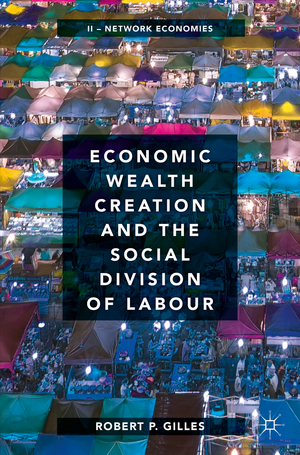Economic Wealth Creation and the Social Division of Labour: Volume II: Network Economies
Autor Robert P. Gillesen Limba Engleză Paperback – 20 feb 2019
—Dimitrios Diamantaras, Temple University,Philadelphia, USA
This textbook introduces and develops new tools to understand the recent economic crisis and how desirable economic policies can be adopted. Gilles provides new institutional concepts for wealth creation, such as network economies, which are based on the social division of labour.
This second volume introduces mathematical theories of the endogenous formation of social divisions of labour through which economic wealth is created. Gilles also investigates the causes of inequality in the social division of labour under imperfectly competitive conditions. These theories frame a comprehensive, innovative and consistent perspective on the functioning of the twenty-first century global economy, explaining many of its failings. Suitable reading for advanced undergraduate, MSc and postgraduate students in microeconomic analysis, economic theory and political economy.
| Toate formatele și edițiile | Preț | Express |
|---|---|---|
| Paperback (2) | 389.88 lei 6-8 săpt. | +21.38 lei 6-10 zile |
| Springer International Publishing – 3 aug 2018 | 427.17 lei 3-5 săpt. | +21.38 lei 6-10 zile |
| Springer International Publishing – 20 feb 2019 | 389.88 lei 6-8 săpt. |
Preț: 389.88 lei
Nou
Puncte Express: 585
Preț estimativ în valută:
74.60€ • 81.29$ • 62.86£
74.60€ • 81.29$ • 62.86£
Carte tipărită la comandă
Livrare economică 23 aprilie-07 mai
Preluare comenzi: 021 569.72.76
Specificații
ISBN-13: 9783030044251
ISBN-10: 3030044254
Pagini: 295
Ilustrații: XIV, 311 p. 48 illus., 45 illus. in color.
Dimensiuni: 155 x 235 mm
Greutate: 0.46 kg
Ediția:1st ed. 2019
Editura: Springer International Publishing
Colecția Palgrave Macmillan
Locul publicării:Cham, Switzerland
ISBN-10: 3030044254
Pagini: 295
Ilustrații: XIV, 311 p. 48 illus., 45 illus. in color.
Dimensiuni: 155 x 235 mm
Greutate: 0.46 kg
Ediția:1st ed. 2019
Editura: Springer International Publishing
Colecția Palgrave Macmillan
Locul publicării:Cham, Switzerland
Cuprins
Chapter 1: Commodities, consumption and production.- Chapter 2: Wealth creation in primitive economies.- Chapter 3: The competitive price mechanism.- Chapter 4: Objective specialisation: The Smithian perspective.- Chapter 5: Production networks.- Chapter 6: Inequality in network economies.
Notă biografică
Robert P. Gilles is Professor of Economics at Queen’s University Belfast, UK. He has previously taught in the USA and the Netherlands. His research focuses on the economic theory of the social division of labour.
Textul de pe ultima copertă
‘This is the second book of a two-volume set that continues Adam Smith's work, using the tools mathematical, experimental, and behavioural economists have developed since 1776. As in the first volume, markets are not the central organising principle. Instead, attention centres on social institutions and the division of labour that they enable. The book studies this via the endogenous division of labour that existing institutions help form. The first book in the series examined this problem deeply, resorting minimally to formal mathematical modelling; the second volume is where the formal modelling blossoms. General equilibrium theory meets network theory and receives a breath of fresh air, including a new viewpoint on economic inequality, the newly resurgent bane of capitalism. What I said for the first volume applies to this second volume equally: if you care to understand the economy, this book belongs to your bookshelf.’
—Dimitrios Diamantaras, Temple University, Philadelphia, USA
This textbook introduces and develops new tools to understand the recent economic crisis and how desirable economic policies can be adopted. Gilles provides new institutional concepts for wealth creation, such as network economies, which are based on the social division of labour.
This second volume introduces mathematical theories of the endogenous formation of social divisions of labour through which economic wealth is created. Gilles also investigates the causes of inequality in the social division of labour under imperfectly competitive conditions. These theories frame a comprehensive, innovative and consistent perspective on the functioning of the twenty-first century global economy, explaining many of its failings. Suitable reading for advanced undergraduate, MSc and postgraduate students in microeconomic analysis, economic theory and political economy.Robert P. Gilles is Professor of Economics at Queen’s University Belfast, UK. He has previously taught in the USA and the Netherlands. His research focuses on the economic theory of the social division of labour.
—Dimitrios Diamantaras, Temple University, Philadelphia, USA
This textbook introduces and develops new tools to understand the recent economic crisis and how desirable economic policies can be adopted. Gilles provides new institutional concepts for wealth creation, such as network economies, which are based on the social division of labour.
This second volume introduces mathematical theories of the endogenous formation of social divisions of labour through which economic wealth is created. Gilles also investigates the causes of inequality in the social division of labour under imperfectly competitive conditions. These theories frame a comprehensive, innovative and consistent perspective on the functioning of the twenty-first century global economy, explaining many of its failings. Suitable reading for advanced undergraduate, MSc and postgraduate students in microeconomic analysis, economic theory and political economy.Robert P. Gilles is Professor of Economics at Queen’s University Belfast, UK. He has previously taught in the USA and the Netherlands. His research focuses on the economic theory of the social division of labour.
Caracteristici
Develops models from the latest insights from network analysis and network economics Includes problem sets at the end of each chapter Develops new tools for economic policy making
